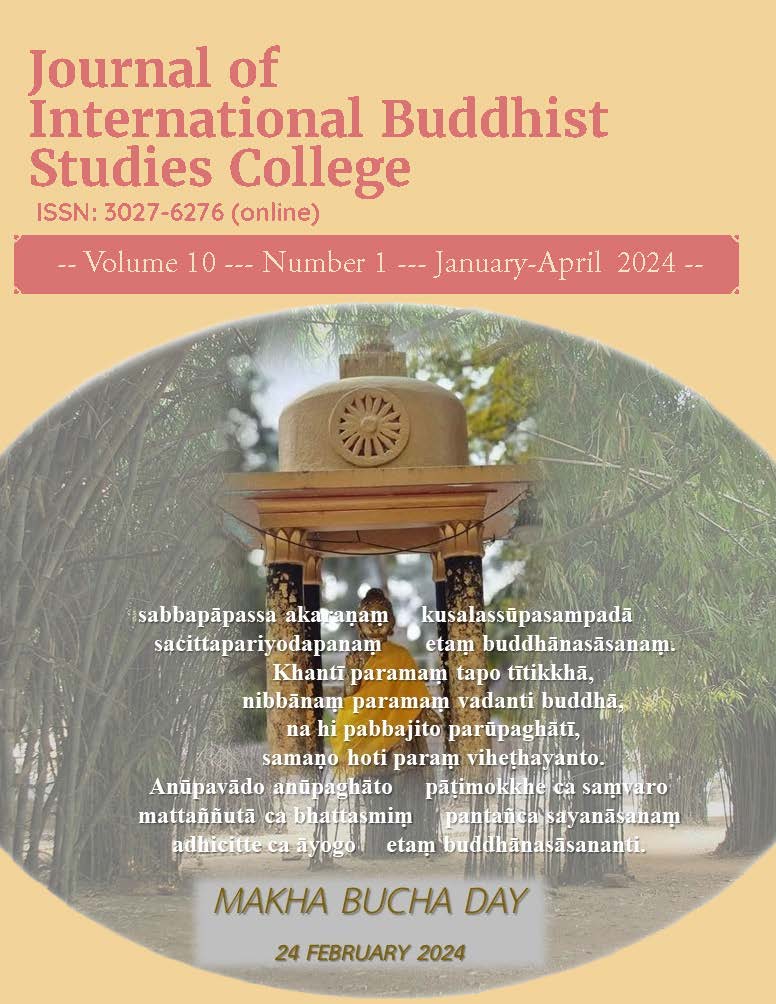Buddhist Psychological Approach for Anger Management in The Contemporary World
Main Article Content
Abstract
This paper aims to propose a Buddhist psychological framework for managing anger in the modern world. It applies Buddhist psychological principles to analyze general problematic situations, the origins of anger, and methods for anger management in modern contexts. This article emphasises three effective strategies for managing anger: 1) The Buddhist behavioural changing involves relaxation methods consisting of the threefold purity of bodily behaviour (kāyasucarita) and communication, which is the fourfold purity of verbal behaviour (vacīsucarita) for controlling anger. 2) The Buddhist cognitive restructuring involves identifying automatic thoughts, recognizing cognitive distortions, and substituting positive thoughts to manage anger effectively. 3) The Buddhist wisdom approach encompasses the application of wisdom through rational attention (yonisomanasikāra) and mindfulness meditation. The outcomes of implementing these methods empower individuals to effectively manage anger and foster mental growth in the contemporary world.
Article Details
The Journal of TCI is licensed under a Creative Commons Attribution-NonCommercial-NoDerivatives 4.0 International (CC BY-NC-ND 4.0) licence unless otherwise stated. Please read our Policies page for more information on Open Access, copyright and permissions.
References
AnālAyo Bhikkhu. (2017). How compassion became painful. Journal Buddhist. Studies, 14, 85-113.
Bhikkhu Bodhi. (2012). The Numerical Discourses of the Buddha: Anguttara Nikāya. Boston, Wisdom Publication Society.
Chun, C. Y. (2019). Buddhist approach to sustainable societies through anger control methods. Buddhist approach to harmonious families, healthcare, and sustainable societies, 427.
De Silva, P. (2014). An introduction to Buddhist psychology and counselling: Pathways of mindfulness-based therapies. Springer.
Hanh, T. N. (2002). Anger: Wisdom for cooling the flames. Penguin.
Katagiri, D. (1988). Returning to silence: Zen practice in daily life. Shambhala Publications.
Muesse, M. (2001). Taking Responsibility for Our Thoughts: Reflections on the Vitakkasaṇṭhāna Sutta. Insight Journal, Spring.
Norman, K. R.. (tr) (2000). The Word of The Doctrine: Dhammapada. Pāḷi Text Society.
Payutto. (2021). Buddhadhamma: The Laws of Nature and Their Benefits to Life. 3rd Edition, Buddhadhamma Foundation.
Quek, J. H. H. (2006). The Buddha's technique and practice of counselling as depicted in the Pali Canon (Doctoral dissertation).
Sharda, G. (2019). The Importance of Right Speech in Buddhism and its Relevance Today. Journal of Religion and Theology, 3(2), 32-38.
Somdet Phra Buddhaghosacariya (P. A. Payutto). (2021). Buddhadhamma: The Laws of Nature and Their Benefits to Life. (3rd ed.). Buddhadhamma Foundation.
Tafrate, R. C., & Kassinove, H. (2019). Anger management for everyone: Ten proven strategies to help you control anger and live a happier life. New Harbinger Publications.
Tiwari, M. (1989). Perspective on Buddhist Ethics. Delhi: Department of Buddhist Studies.
Walshe, M. (1995). The Long Discourses of the Buddha: Dīgha Nikāya. Boston, Wisdom Publication Society.


